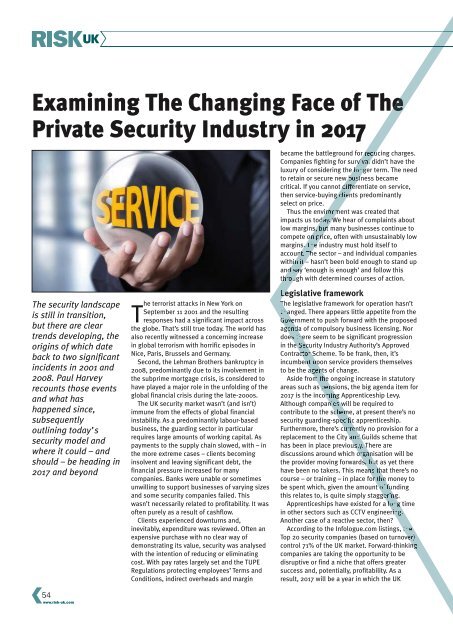RiskUKApril2017
You also want an ePaper? Increase the reach of your titles
YUMPU automatically turns print PDFs into web optimized ePapers that Google loves.
Examining The Changing Face of The<br />
Private Security Industry in 2017<br />
The security landscape<br />
is still in transition,<br />
but there are clear<br />
trends developing, the<br />
origins of which date<br />
back to two significant<br />
incidents in 2001 and<br />
2008. Paul Harvey<br />
recounts those events<br />
and what has<br />
happened since,<br />
subsequently<br />
outlining today’s<br />
security model and<br />
where it could – and<br />
should – be heading in<br />
2017 and beyond<br />
54<br />
www.risk-uk.com<br />
The terrorist attacks in New York on<br />
September 11 2001 and the resulting<br />
responses had a significant impact across<br />
the globe. That’s still true today. The world has<br />
also recently witnessed a concerning increase<br />
in global terrorism with horrific episodes in<br />
Nice, Paris, Brussels and Germany.<br />
Second, the Lehman Brothers bankruptcy in<br />
2008, predominantly due to its involvement in<br />
the subprime mortgage crisis, is considered to<br />
have played a major role in the unfolding of the<br />
global financial crisis during the late-2000s.<br />
The UK security market wasn’t (and isn’t)<br />
immune from the effects of global financial<br />
instability. As a predominantly labour-based<br />
business, the guarding sector in particular<br />
requires large amounts of working capital. As<br />
payments to the supply chain slowed, with – in<br />
the more extreme cases – clients becoming<br />
insolvent and leaving significant debt, the<br />
financial pressure increased for many<br />
companies. Banks were unable or sometimes<br />
unwilling to support businesses of varying sizes<br />
and some security companies failed. This<br />
wasn’t necessarily related to profitability. It was<br />
often purely as a result of cashflow.<br />
Clients experienced downturns and,<br />
inevitably, expenditure was reviewed. Often an<br />
expensive purchase with no clear way of<br />
demonstrating its value, security was analysed<br />
with the intention of reducing or eliminating<br />
cost. With pay rates largely set and the TUPE<br />
Regulations protecting employees’ Terms and<br />
Conditions, indirect overheads and margin<br />
became the battleground for reducing charges.<br />
Companies fighting for survival didn’t have the<br />
luxury of considering the longer term. The need<br />
to retain or secure new business became<br />
critical. If you cannot differentiate on service,<br />
then service-buying clients predominantly<br />
select on price.<br />
Thus the environment was created that<br />
impacts us today. We hear of complaints about<br />
low margins, but many businesses continue to<br />
compete on price, often with unsustainably low<br />
margins. The industry must hold itself to<br />
account. The sector – and individual companies<br />
within it – hasn’t been bold enough to stand up<br />
and say ‘enough is enough’ and follow this<br />
through with determined courses of action.<br />
Legislative framework<br />
The legislative framework for operation hasn’t<br />
changed. There appears little appetite from the<br />
Government to push forward with the proposed<br />
agenda of compulsory business licensing. Nor<br />
does there seem to be significant progression<br />
in the Security Industry Authority’s Approved<br />
Contractor Scheme. To be frank, then, it’s<br />
incumbent upon service providers themselves<br />
to be the agents of change.<br />
Aside from the ongoing increase in statutory<br />
areas such as pensions, the big agenda item for<br />
2017 is the incoming Apprenticeship Levy.<br />
Although companies will be required to<br />
contribute to the scheme, at present there’s no<br />
security guarding-specific apprenticeship.<br />
Furthermore, there’s currently no provision for a<br />
replacement to the City and Guilds scheme that<br />
has been in place previously. There are<br />
discussions around which organisation will be<br />
the provider moving forwards, but as yet there<br />
have been no takers. This means that there’s no<br />
course – or training – in place for the money to<br />
be spent which, given the amount of funding<br />
this relates to, is quite simply staggering.<br />
Apprenticeships have existed for a long time<br />
in other sectors such as CCTV engineering.<br />
Another case of a reactive sector, then?<br />
According to the Infologue.com listings, the<br />
Top 20 security companies (based on turnover)<br />
control 71% of the UK market. Forward-thinking<br />
companies are taking the opportunity to be<br />
disruptive or find a niche that offers greater<br />
success and, potentially, profitability. As a<br />
result, 2017 will be a year in which the UK

















